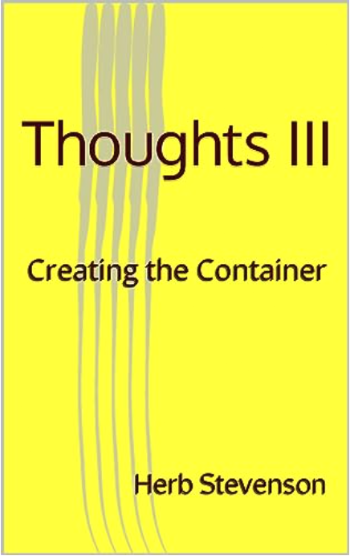

A book by Herb Stevenson, Volume 1. Learn more on Amazon.
Thoughts II:
The Next Step: A Calling

Volume 2 of 3. Learn more on Amazon.
Thoughts III:
Creating The Container

Volume 3 of 3. Learn more on Amazon.
To Lead
Read the article about training with Herb Stevenson in ALN Magazine.
See the article...
Transformative Change
Transformative Change is a philosophical, practical and strategic process to effect revolutionary change within an organization, i.e., culture transformation. It is a systems approach applied to broad-based change to catalyze rapid shifts in the mental constructs inhibiting solutions to complex problems or in the organization’s culture that prevent it from realizing its full potential. It seeks to discover and integrate personal and organization development as an overarching approach to rapid change at all levels of system. It seeks to impact the mental constructs inhibiting solutions to complex problems or to completely shift the equilibrium of the organization to create a new culture.
Transformation is a Process
Transformation is a process through which who we are, individually and organizationally, is changed so deeply that the following are altered:
- Our identity as an individual as well as a part of the organization. Our very way of perceiving, thinking, reflecting, and making-meaning about ourselves and the organization shifts.
- Our emotions become more alive and expressive. The range of feelings and our reactions to the organization shifts.
- Our place within the organization becomes clearer. Our relationship and connectedness to and within the organization and how we show up shifts.
- Our actions become more consistent and congruent with who we are and how we fit in the organization. Our behaviors become more conscious thereby eliminating patterned responses that no longer serve us.
- Our creativity appears as we increase our capacity for responsiveness and ability to access resources within ourselves as well as within the organization.
- Our paradigms shift such that our overall perspective and mode of operating enable more connectivity and congruence between individuals and the organization.
Transformation is about "Being the Change"
Transformative change embraces Gandhi's prophetic words that "we must be the change we want to see happen in the world." The process of transformative change always mirrors what it seeks to create. While honoring the lessons of the past and planning for the future, transformational change has a strong focus on what's happening right now, in the present...the point of infinite possibilities. For example, in individual change processes, while appreciating the impact of our past and establishing goals for the future, the power of transformative change is in actually becoming the fullness of who we are right here, right now. Or if we intend to create an organization culture to meet the changing economy more effectively, we must "be the change" right now by initiating an inclusive process of change.
Outcomes Sought
The transformative change process leads to a capacity to more skillfully practice presence, authenticity and interdependence throughout the organization. This is directly related to having greater awareness, clarity, and comfort with what is happening within the organization. Breakthroughs in ways of knowing, thinking, and accessing creativity increase as judgmental constructs dissolve. Our character is impacted in a way that is observable, felt and experienced by others. There is an increased ability to respond from a place of vision and compassion rather than ego or self-interest.
Not for the faint-hearted.
Transformative change requires vision and a commitment to implementation that will be tested through the crisis creating forces from the past to prevent the change. Once initiated, it is difficult to erase the awareness of what could be. Yet, the results can be astounding as exemplified by the transformative change of IBM led by Louis Gerstner in the 90's.
Transformation of an enterprise begins with a sense of crisis, or urgency. Changing the attitude and behavior of thousands of people is very, very hard to accomplish. You can't simply give a couple of speeches or write a new credo for the company and declare that a new culture has taken hold. You can't mandate it, can't engineer it. What you can do is create the conditions for transformation, provide incentives.
- Louis V. Gerstner, Jr.
Related Services
Learn More About Our Innovative Change Methods with ZING!
Read a ZING case study with the American International School of Rotterdam
![]() Visit Our Media Page for audio interviews and videos by Herb Stevenson and affiliates.
Visit Our Media Page for audio interviews and videos by Herb Stevenson and affiliates.



